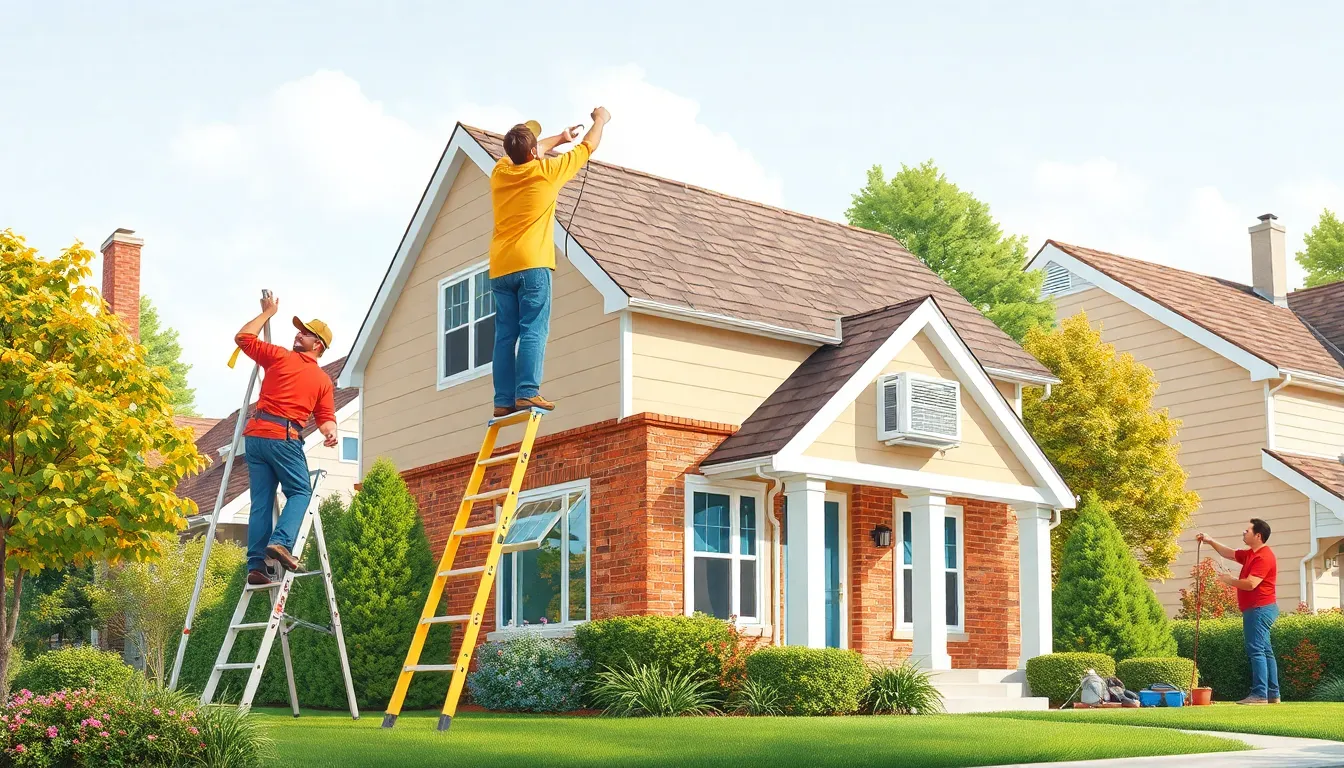Buying a home is like adopting a pet—exciting, a little scary, and definitely a long-term commitment. New homeowners often find themselves knee-deep in paint cans and lawn care manuals, wondering how to keep their castle standing strong. Fear not! With a few savvy home maintenance tips, they can transform their humble abode into a well-oiled machine, or at least something that doesn’t resemble a scene from a horror movie.
Table of Contents
ToggleUnderstanding Home Maintenance
Home maintenance plays a crucial role in preserving property value and ensuring a safe living environment. New homeowners must grasp the importance of maintaining their homes systematically.
Importance of Regular Maintenance
Regular maintenance prevents costly repairs. It also enhances energy efficiency. Creating a maintenance schedule helps homeowners stay on track. Addressing issues early reduces stress and minimizes future expenses. Routine checks on appliances, plumbing, and roofing ensure safety and functionality. Research indicates that properties with consistent upkeep retain higher market value. Homeowners can maximize their investments by prioritizing maintenance efforts.
Common Home Maintenance Tasks
Several tasks are essential for maintaining a home. Inspecting the roof every six months helps identify damage. Cleaning gutters prevents water damage and pest infestations. Changing air filters improves indoor air quality and HVAC efficiency. Checking smoke detectors and carbon monoxide alarms ensures safety. Although landscaping care strengthens curb appeal, seasonal maintenance such as snow removal or lawn care prevents complications. Regularly testing faucets and drains keeps plumbing in optimal condition. Balancing these tasks increases overall home longevity.
Seasonal Maintenance Checks

Seasonal maintenance checks ensure a home remains in top condition throughout the year. Homeowners should be aware of specific tasks for each season to preserve property value and avoid costly repairs.
Spring Maintenance Tips
Spring often requires homeowners to inspect their roofs for damage caused by winter weather. Cleaning gutters is essential to prevent water buildup and associated damage. It’s also wise to check air conditioning systems, ensuring they function efficiently before the heat arrives. Fertilizing the lawn offers an opportunity to promote healthy growth during the warmer months.
Summer Maintenance Tips
Summer presents the perfect time for exterior painting or refreshing siding. Homeowners should regularly trim trees and shrubs to enhance curb appeal and prevent overgrowth. Inspecting windows and doors for air leaks helps maintain energy efficiency. Scheduling a comprehensive HVAC check in early summer guarantees comfort throughout the season.
Fall Maintenance Tips
Fall maintenance plays a crucial role in preparing homes for winter. Homeowners must clean gutters again to accommodate falling leaves. Checking the heating system ensures readiness for colder temperatures. Sealing any gaps around windows and doors improves insulation, further enhancing energy efficiency. Raking leaves prevents lawn damage and prepares yards for winter dormancy.
Winter Maintenance Tips
Winter requires homeowners to monitor their heating systems closely for optimal performance. Regularly checking insulation helps retain heat, reducing energy costs. Preventing ice dams by keeping gutters clear allows for proper drainage. It’s also important to test smoke and carbon monoxide detectors each month to ensure safety during the heating season.
DIY Maintenance Projects
Home maintenance projects can empower new homeowners to tackle repairs and improve their living spaces. Understanding basic repairs and possessing essential tools fosters a sense of confidence in managing a home.
Basic Repairs Every Homeowner Should Know
Homeowners should learn essential repairs to manage common household issues efficiently. Fixing leaky faucets can prevent higher water bills and damage. Repairing minor wall cracks improves aesthetics and prolongs life. Changing light switches enhances safety and functionality. Patching small holes in drywall restores a clean appearance. Understanding how to unclog drains helps maintain plumbing systems. Each of these skills contributes to a well-maintained home and reduces reliance on professional services.
Tools Every New Homeowner Should Own
Every homeowner benefits from possessing necessary tools for maintenance tasks. A reliable screwdriver set aids in various assembly projects and repairs. Adjustable wrenches provide versatility for loosening and tightening nuts and bolts. A tape measure guarantees accurate measurements for home improvement projects. Pliers assist in gripping, twisting, and cutting wires. Having a level ensures straight lines when hanging pictures or shelves. Additionally, a sturdy utility knife simplifies cutting tasks. Equipping a home with these basic tools allows homeowners to address maintenance efficiently and confidently.
Hiring Professionals
New homeowners sometimes face tasks that require professional expertise. Identifying when these situations arise is crucial.
When to Call a Professional
Calling a professional often makes sense when a job exceeds a homeowner’s skill level. Complex electrical work demands qualified technicians to ensure safety. Plumbing issues like significant leaks or clogs usually benefit from expert assistance. Structural concerns, including foundation cracks or roof damage, warrant immediate professional evaluation. Routine maintenance tasks like HVAC servicing also require trained technicians to uphold system efficiency. Prioritizing home safety and functionality should guide decisions about hiring professionals.
Finding a Reliable Contractor
Finding a reliable contractor involves thorough research. Asking friends or family for recommendations can provide trusted leads. Online reviews offer insights into various professionals’ reputations and experiences. Checking licenses and insurance protects homeowners from potential liabilities. Obtaining multiple estimates allows homeowners to compare prices and services before committing. Establishing open communication about expectations and timelines helps build a strong working relationship. Prioritizing transparency fosters trust and satisfaction throughout the project.
Budgeting for Home Maintenance
Budgeting for home maintenance ensures new homeowners can effectively manage costs associated with property upkeep. Proper financial planning helps avoid surprises and promotes a well-maintained home.
Creating a Maintenance Budget
Creating a maintenance budget starts with understanding annual costs associated with home upkeep. Allocate 1% to 3% of the home’s purchase price yearly for maintenance. Include routine services like HVAC inspections, roof repairs, and landscaping. Research local service fees for accurate estimates, and factor in seasonal adjustments for tasks like winterizing pipes or cleaning gutters. Regularly review expenses to identify trends or unexpected costs, ensuring adjustments align with ongoing needs.
Tips for Cost-Effective Maintenance
Cost-effective maintenance doesn’t require sacrificing quality. Prioritize regular checks on essential systems, including heating, plumbing, and electrical. DIY projects often save money and provide valuable experience. Utilize online tutorials for guidance on repairs and upgrades. Join local community groups to share resources and tools. Seasonal maintenance tasks often prevent larger, expensive issues down the road. Taking advantage of local discounts or promotions can further reduce costs while keeping the home in top shape.
Embracing homeownership is a rewarding journey filled with opportunities for growth and improvement. By implementing the maintenance tips discussed, new homeowners can cultivate a safe and inviting living space while protecting their investment. Staying proactive with regular inspections and seasonal checks ensures that minor issues don’t escalate into costly repairs.
Balancing DIY projects with professional help as needed will enhance both the home’s functionality and aesthetic appeal. With a solid maintenance plan in place and a mindful approach to budgeting, homeowners can enjoy the comforts of their new abode without the stress of unexpected challenges. Prioritizing these practices lays the foundation for a successful and enjoyable homeownership experience.



